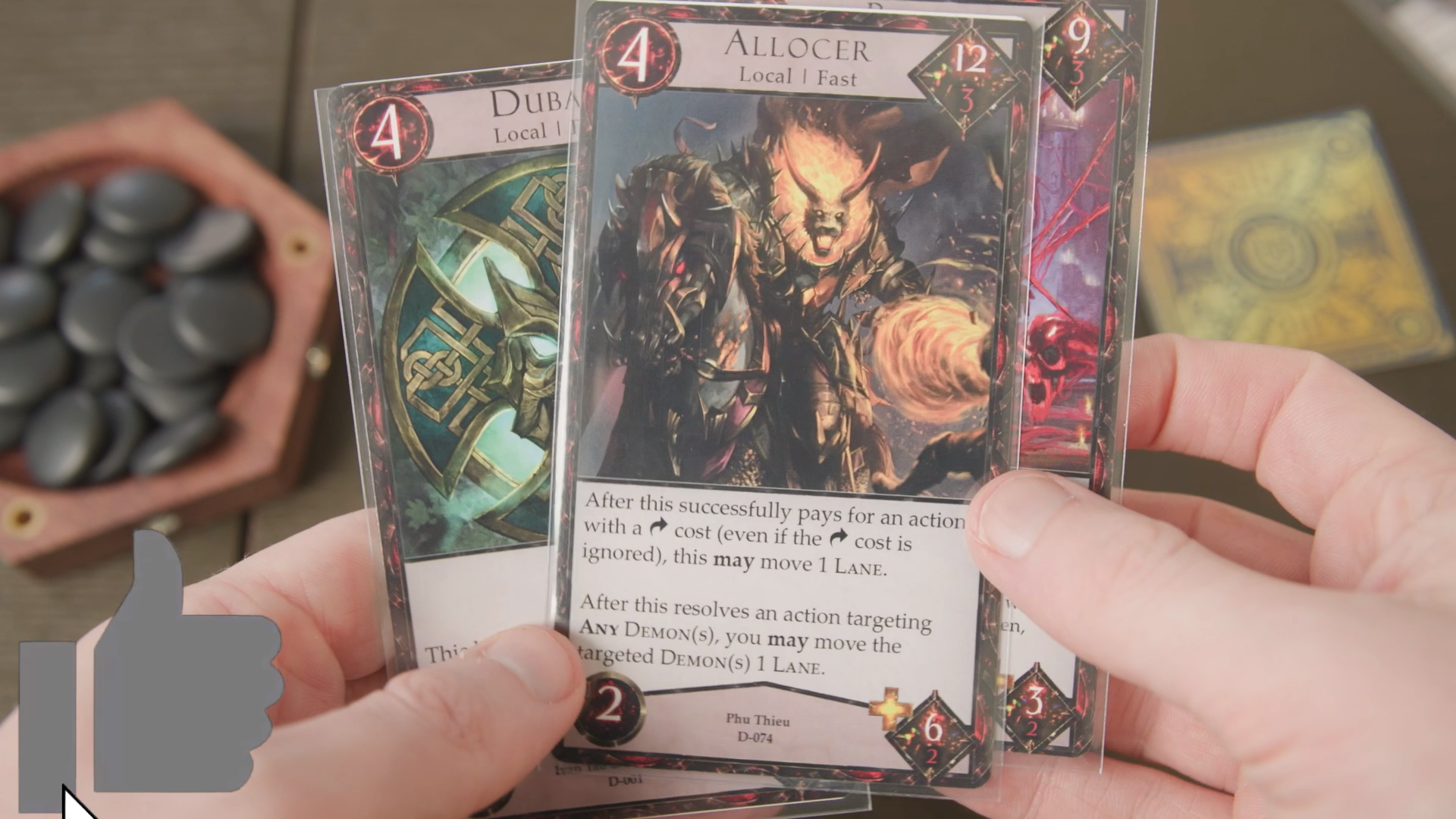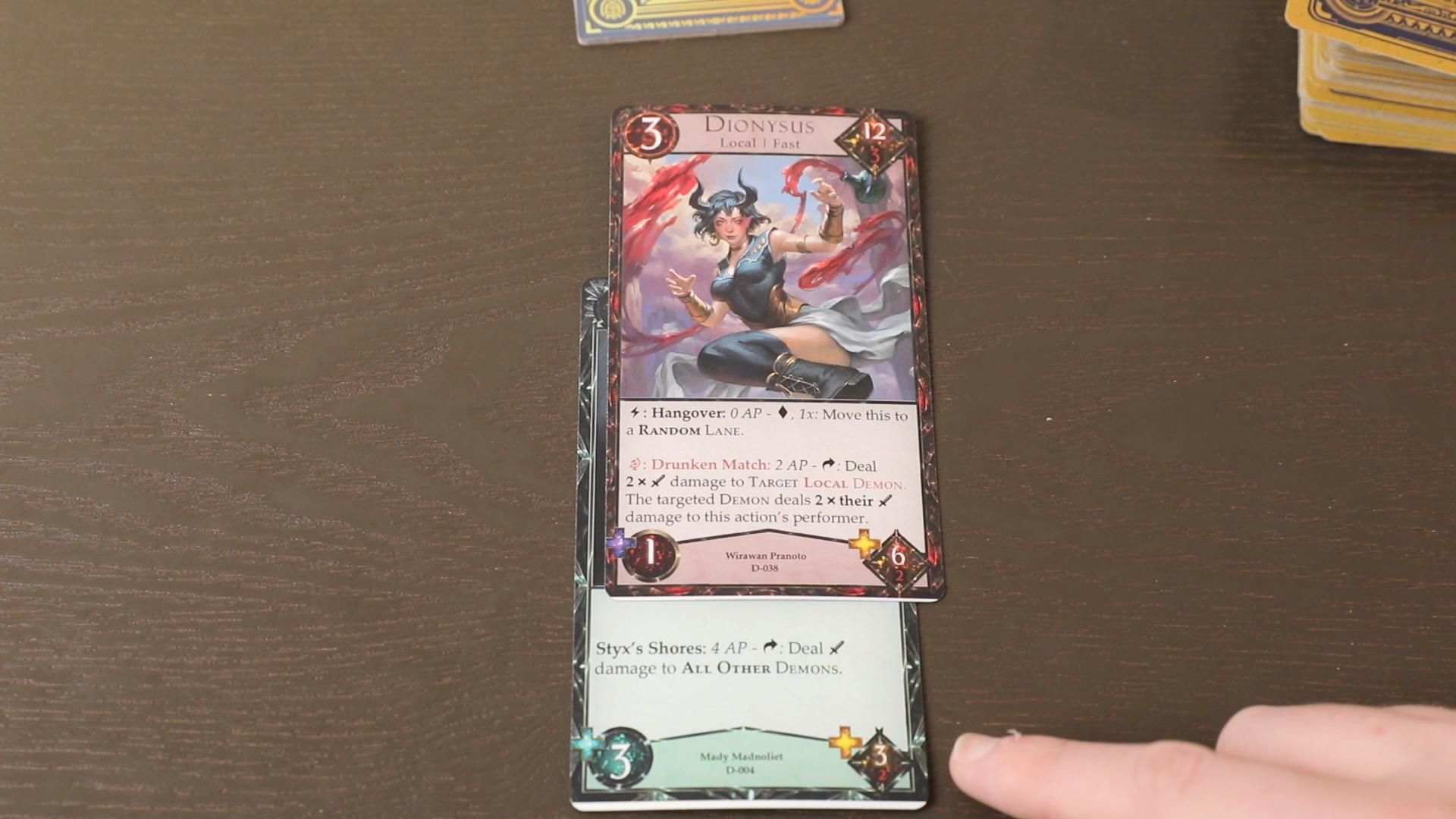Evokers Prototype Review
The simplest and most complicated card game, as you fuse demons together.
Evokers is a high-complexity card dueler brimming with edgy demon art and mind-bending fusion combos. For 2 players, with possible 4 player mini-tournaments. Plays in roughly 45-60 minutes.
Video published December 27th, 2024
This is a sponsored post. Prototype featured.
The Story
In Evokers, both players play as human mages making contracts with otherworldly demons, eventually paying a price in corruption. Both players draw demons from a massive 120-card shared deck and contract one demon per turn.
We played ten games with an average game length of 45 to 60 minutes (outliers include a 10 minute and 90 minute game). We also did a 4 player mini tournament where each player made their own 15 card deck.
Need to learn how to play? Or want more reasoning for our points? Our review video’s got you!
Component Pros - Incredible artwork and good graphic design
Over 120 uniquely illustrated demon cards plus 40 familiars.
Each demon’s distinct design adds strong thematic flavor and reduces confusion between cards.
Color-coded ranges (red/local, blue/distant, green/any) cuts down on constant rule lookups.
Icons like lightning bolts (instant actions) or diamonds (card must be ready, but need not exhaust) streamline a text-heavy game.
Gameplay Pros - Deep Fusion Mechanic
Stacking a demon onto another merges stats and abilities, while also readying the fused demon.
Encourages huge strategic decisions: two decent threats vs one powerhouse that’s also a big corruption risk.
The strong, fused demons having high corruption values nicely influences game time as losing one will quickly push you towards defeat.
Perfect mechanic for combo-driven players who crave experimentation.
Gameplay Pros - Tactical Positioning
Splitting the battlefield into three lanes creates more decision making space as you try to outmaneuver your opponent
Smart positioning can swing an entire match, making demons that move friends and enemies key to victory.
Gameplay Pros - AP and Initiative
Action Points (AP) reward planning. Spend AP early to quickly deal damage or save for a huge combo play later in the round
Instant actions can be played on your opponent’s turn, further incentivizing saving AP.
Initiative values on cards and a back-and-forth tie-breaker introduce both bluffing and semi-unpredictable turn order.
Some demons give universal actions, enabling wide-board strategies.
Gameplay Pros - Absurd Replay Value
With 120 demons, 40 familiars and fusion combos, no two games will play out the same.
Virtually unlimited experimentation for players who enjoy emergent synergy.
It also includes variants!
Play with the standard 120 card deck or change it up with 15 card personalized decks (or even drafting)!
Dispel variant allows players to discard their opponent’s contracted demon.
This enables interesting strategy as you plan to bait out your opponent’s dispel token so your move valuable demon can hit the board safely.
Amend Fate variant lets players spend 1 action point to discard a card to draw a card.
In a standard game where both players draw from the 120 card deck, this can help a player focus on one particular strategy.
Component Cons - Rulebook and Component Hurdles
Prototype documentation is messy, with missing definitions and confusing formatting.
Corruption points can be hard to read, especially on fused demons
Player aids aren’t always laid out intuitively.
Corruption points leads to an unpleasant acronym. Best to use corruption value instead.
Tracking layered abilities and recalculating health after partial damage can be cumbersome.
Multiple fused demons on both sides can spike downtime and lead to frequent misplays.
Corruption point visuals is white (correct) on some cards, red (incorrect) on others.
Gameplay Cons — Clogged Board States
High corruption stakes encourage players to keep demons alive by stacking armor and health.
Can result in beefy boards and drag certain matches over the 60 minute mark.
Providing curated mini-decks, clearer deck-building guidelines or better packaging to divide cards would help ease players into specific combos/synergies without drowning them in choice.
Gameplay Cons — Unwieldy Familiar Mechanic
Some demons require you to go through a separate 40 card deck to see their familiar spawn.
Raises playtime, cannot intuit what familiar does by reading summoning demon.
Unnecessarily raises the barrier to entry, makes ‘dispel’ usage very tricky here.
Without memorizing the entire familiar set, counterplay is tough.
Gameplay Cons — Unpleasant Randomness
A single 120-card pool means plenty of variety but leaves new players confused as to what strategy they should build for when starting.
Drafting or custom decks are possible, but the rules only hint at these modes, leaving it up to the players.
The Amend Fate rule adds to bad randomness as your opponent cannot predict what demons will be contracted by their opponent after drawing one out of 120 cards.
Despite the “one card a turn” premise, stacked powers and advanced triggers can quickly become overwhelming.
Ideal for serious gamers, though the steep complexity may deter a more casual crowd.
Tentative Score: 7/10
After weighing the pros and cons of this prototype, we're giving Evokers a 7/10. It's tentatively good. Evokers does a remarkable job of creating sprawling board states full of unique, eye-catching demons drawn from a massive deck, and it avoids breaking under that weight because the demons are generally well-balanced. The fusion mechanic further elevates these board states. Still, even though the basic rules are straightforward, the intricacy of individual demon abilities and the ways they interact means this game is not for the faint of heart.
Even though we've played Evokers many times, we still find ourselves referencing the rulebook because new demons keep surfacing with unfamiliar abilities and timing triggers. When demons start fusing and forming even more complex creatures, the game's complexity rises to a level we haven't seen in most other card games. It can be thrilling for those who love discovering combos and puzzling out synergy, but it can also overwhelm even experienced card players.
In that sense, it's hard not to be impressed by the sheer design scope. Every demon feels like a mini-story, and you're constantly testing which ones might fuse for new possibilities. The question is whether all that reading and technical detail is worth it for you, dear reader. In Yu-Gi-Oh!, fusion is a highlight or a rare event, whereas in Evokers, it's part of everyday gameplay. For instance, adding melee bonuses to a ranged attacker would be huge in many other games, but it's just another turn here.
Evokers isn't trying to be a trading card game; the designers call it a "kitchen dueler" or a "MOBA-like" card game. The dispel mechanic is directly inspired by MOBA champion bans, and it's easy to see parallels to DOTA's "if everything is overpowered, nothing is" mantra. In Evokers, nearly every demon has a powerful twist, so they sort of balance out.
Mammon, for example, perfectly embodies Evokers in one card. It has imposing stats and swaps sides at the start of each turn, which feels absurd until you realize you can fuse it with other demons or exploit its ability to unexhaust itself. Suddenly, you're marching it out of harm's way to avoid getting punished when it flips over. Moments like this highlight how Evokers can be simple and wildly complex when the right demons enter play.
At its core, Evokers is the most straightforward yet most complicated 1v1 mage-dueler I've tried. You might finish a game in ten minutes or stretch it beyond an hour. It's easy to grasp the basics, but the learning curve is steep if you want to master it—especially if you're using the entire deck plus variants like dispel and amend fate. You need to know most, if not all, of the 120 demons to play at a high level.
We recently hosted a mini-tournament with four players that lasted about two hours, and it was fantastic! We played various deck styles, from a familiar-based swarm strategy to a powerful beatdown build. The card game veteran players quickly grasped the complex combos, while newer players took a bit longer to adjust to the intricate mechanics. Regardless, everyone agreed that the tournament showcased the variety and depth of Evokers, reinforcing our belief in its great potential. For new players, they could get a lot of fun out of drafting their decks for such a format. Perhaps by drawing sets of four face-up cards and letting everyone see and pick a card until reaching 15.
Suppose you thrive on open-ended possibilities and don't mind a bit of rulebook referencing. In that case, Evokers can be a standout experience, provided you have a partner equally fascinated by demon fusion. It's a highly technical and punishing game where every summon matters, and most matches resolve in about three rounds. Even in this prototype form, it delivers plenty of memorable scenarios and feels like a promising "alpha" version of what it could become by its planned April 2025 release. Don't be surprised if the final product merits an 8 or even a 9 out of 10, just be aware that it targets a more niche crowd than something mainstream like Star Wars Unlimited or Magic: The Gathering.
























